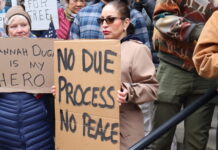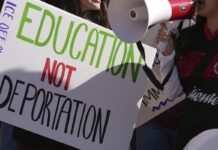
(GA Recorder) — South Carolina Sen. Lindsey Graham will have to testify before a Fulton County special grand jury investigating 2020 election interference after the U.S. Supreme Court on Tuesday rejected his attempt to quash the subpoena.
The Supreme Court’s unsigned decision sets up a scheduled Nov. 17 showdown – which would be the latest trip to Georgia in several weeks for the veteran senator, who is expected to face questions about whether he tried to pressure state election officials to overturn former President Donald Trump’s 2020 loss to President Joe Biden.
The Supreme Court’s order does exempt Graham from having to answer questions directly tied to his legislative duties.
Attorneys for the senator said that when he called the Georgia secretary of state’s office about the state’s procedures for disqualifying absentee ballots and other election matters, he was acting under his responsibilities of certifying elections and as chairman of the Senate Judiciary Committee.
According to the unsigned order, Graham’s speech or debate clause immunity does not justify blocking him from appearing before the grand jury. The Constitution’s Speech or Debate clause shields lawmakers from certain criminal or civil proceedings connected to their legislative duties.
Graham asked the Supreme Court last month to reverse a U.S. District Court judge’s ruling denying Graham’s motion to suppress the subpoena, with some restrictions on having to answer questions about details Graham discussed with Georgia Secretary of State Brad Raffensperger and other officials as part of his “fact-finding” mission before certifying the election
Graham’s appearance is to occur before a 23-member panel that will issue a report with recommendations whether Fulton County District Attorney Fani Willis should pursue charges in a wide-ranging and long-running probe with dozens of witnesses that include some of Trump’s closest allies and Georgia political officials.
Willis initiated the investigation spurred by the public release of a recorded January 2020 phone call in which Trump pressed Raffensperger to find enough ballots to overcome Biden’s victory.
Last week, a South Carolina judge ordered Trump’s ex-chief of staff Mark Meadows to appear in the Atlanta courthouse after he fought the grand jury’s subpoena. Among those who have testified in the grand jury probe are Trump’s former personal attorney Rudy Giuliani, named by prosecutors as a target for his role in pushing baseless allegations of widespread voter fraud in Georgia.
Meanwhile, a Fulton judge in charge of overseeing the special investigation has ordered that Georgia GOP Gov. Brian Kemp must testify following his Nov. 8 re-election bid against Democrat Stacey Abrams. The judge in that case rejected arguments that the governor could avoid a grand jury appearance because of executive privilege and sovereign immunity, which protects the state from being sued without its consent.
And the grand jury will also hear from nearly all of the 16 Georgia Republicans who, during a secret December 2020 meeting at the Capitol, served as fake electors and cast illegitimate votes for Trump. A judge ruled in July that the exception is Republican state Sen. Burt Jones, who participated in the meeting of fake electors. Jones does not need to testify in Willis’ investigation because she hosted a June fundraiser for his opponent in this year’s lieutenant governor’s race, Democrat Charlie Bailey.







